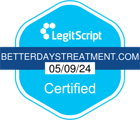Non-12-step rehab programs offer alternative approaches to addiction treatment that do not rely on the traditional 12-step model. Here are 10 ways non-12-step rehab can help you reach your goals:
Individualized treatment plans: Non-12-step rehab
Non-12-step rehab programs typically tailor treatment plans to meet the specific needs of each individual. This personalized approach allows for a more targeted and effective treatment experience. Non-12-step rehab programs often take a holistic approach to treatment, addressing the physical, emotional, and spiritual aspects of addiction. This comprehensive approach can help individuals achieve overall well-being and balance in their lives.
Alternative therapies: Non-12-step rehab
Non-12-step rehab programs often incorporate alternative therapies such as yoga, meditation, art therapy, equine therapy, and mindfulness practices. These therapies can help individuals explore new coping mechanisms, reduce stress, and promote self-discovery. Many non-12-step rehab programs are equipped to address co-occurring mental health disorders alongside addiction. This integrated approach ensures that individuals receive comprehensive care for all their needs.
Non-12-step rehab programs often prioritize addressing the underlying issues that contribute to addiction, such as trauma, grief, or unresolved emotional pain. By working through these issues, individuals can achieve long-lasting recovery.
Supportive community: Non-12-step rehab
Non-12-step rehab programs often foster a supportive community environment where individuals can connect with peers who are going through similar experiences. This sense of community can provide a strong support system during and after treatment. Non-12-step rehab programs may offer flexible treatment options, such as outpatient or intensive outpatient programs, allowing individuals to receive treatment while maintaining their daily responsibilities. Non-12-step rehab programs often utilize evidence-based therapies that have been scientifically proven to be effective in treating addiction, such as cognitive-behavioral therapy (CBT), dialectical behavior therapy (DBT), or motivational interviewing.
Emphasis on self-empowerment: Non-12-step rehab
Non-12-step rehab programs often focus on empowering individuals to take control of their recovery journey. This approach encourages individuals to develop their own strategies for maintaining sobriety and making positive life changes.
Non-12-step rehab programs often offer ongoing support after treatment, such as alumni programs or aftercare services. This continued support can help individuals stay connected and motivated in their recovery journey.

